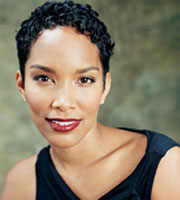
 |
|||
| |
|||
  Mara Brock Akil, creator and executive producer of UPN's Girlfriends, says diversity among the show's writers and crew makes it a success. Akil and Girlfriends photos © 2002, 2003 Paramount Pictures. All rights reserved. |
Girlfriend — with an Agenda
“Every artist is a politician inside,” says Mara Brock Akil (J92), creator and executive producer of the UPN sitcom Girlfriends. “I have an agenda.” Girlfriends, a show about female friendship, is frequently described as an African American Sex and the City. With a core audience of young black women, Akil uses her show to explore relationships and issues of sexual health — all while making people laugh. “Our health issues are often ignored,” says Akil. “Here’s an opportunity to bring some of our concerns to light.” Among the subjects she has tackled are fibroids, “a significant woman-of-color problem,” and men who have sex on the “down low,” which means they are sleeping with other men without telling their female partners. “Of the new AIDS cases, one-third are black women. It’s huge,” she says. “A lot of black men do not feel comfortable coming out and saying they are gay, so they are keeping it secret, living in denial and bringing it home to women, who are dying.” Another episode depicted a woman who failed to use a condom because she thought her date, a nice doctor, must be clean. The episode, titled “The Burning Vagina Monologues,”— because “it still has to be funny” — won a Sexual Health in Entertainment Award. Girlfriends consistently ranks among the top two or three shows in black households, although it falls into the hundreds among white households. The gap is due partly to UPN’s weak distribution in smaller markets and partly to a persistent racial segregation in TV viewing. “TV is changing. Across the board, it’s more niche programming, and race is a part of a niche,” Akil says. “However, I think ultimately it’s a reflection of American society. As much as we think we have grown past certain issues, I don’t think we have. We’re forced to deal with each other at work and in our neighborhoods, but in the privacy of our homes, we’re still going to our own. Watching TV is like inviting people over for dinner.” Still, Akil is proud that her show has some crossover appeal among women of all races, and behind the scenes, she has assembled a diverse staff of writers and crew members. “There are a lot of women in top positions, black, white, Asian, Polynesian, Latino, gay and Jewish,” says Akil, who is Muslim. “It’s a beautiful, ‘We Are the World’ thing, and it’s one key to the success of the show.” When Akil walks into the writers’ room, it’s clear she and this eclectic group have a great time generating jokes, acting out lines and dishing about the actors. They laugh a lot, while still getting down to business. Dressed in a camel-colored sweater and a jean skirt Akil sits at the head of the table, firmly in charge, as they trim the script for an upcoming episode. “Let’s be honest, I don’t think these are really big jokes,” she says, suggesting a cut. “I felt like the blue bar scene was a little flat. If there’s any way we could punch that up?” On her way out, Akil grabs an apple and heads into her office, which has fuchsia carpet and pink walls, as well as an abstract painting of Muhammad Ali and Malcolm X made by her husband of five years, Salim Akil, who was executive producer of the Showtime series Soul Food. “I’m pregnant, so all I do is eat,” she says, referring to the apple. “The baby [her first] is due at the perfect hiatus time.” Good timing is good fortune because television never stops. Unlike many sitcom show runners, who keep their writers working into the wee hours of morning, however, Akil has found a happy balance. “I’m a boss who loves going home to her husband,” she says. “My family is my gas station. They really fill me up.” Akil first realized she wanted to work in a creative field when she penned and acted in a sketch comedy show for Northwestern’s Black Student Union. Then Performance Studies professor Njoki McElroy (GC70, 73) also asked her to play the lead in The Colored Museum, which “opened me up,” Akil says. Finally, after meeting screenwriting teacher Delle Chatman at a meeting of the Organization of Black Screenwriters, Akil begged her way into a class and found her calling. She moved to Los Angeles a year after graduation, where Northwestern alumnus and assistant director, Jerry Ziesmer (C61), told her to “put my last two films on your résumé.” She took him up on the offer and landed a job as a production assistant. Akil says she had “no real dilemmas” lying on her résumé to land a job “answering someone’s phone and getting coffee” for $180 a week. A year later, she became a writer’s trainee on South Central, a half-hour dramedy about a single-parent African American family in Los Angeles. The producers from that show hired her as a writer on the UPN sitcom Moesha, where she worked for four years, learning every aspect of TV writing and production, from casting to editing and mixing. “I was aggressive,” she says. “I wanted a lot, and they were not intimidated by that. They welcomed me and nourished me.” After a year with The Jamie Foxx Show, a half-hour sitcom about an aspiring actor who works in a Los Angeles hotel, Akil was asked to create her own series at age 29. “You have a better chance of winning the lottery than getting a TV show on the air,” she says. “I know I am blessed.” — J.H. |